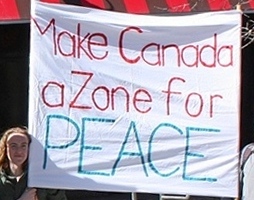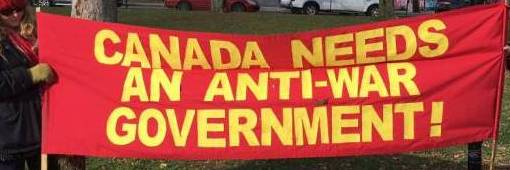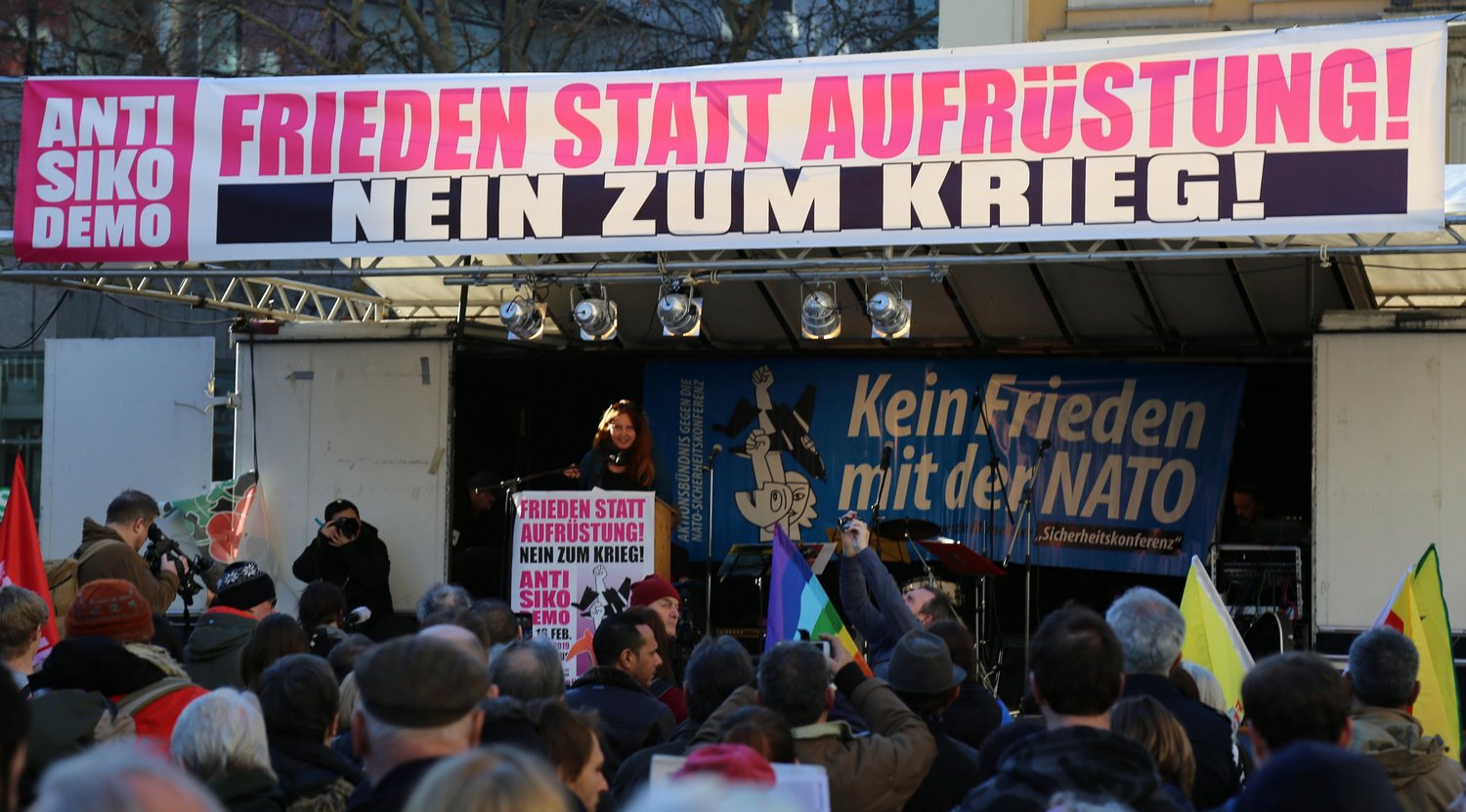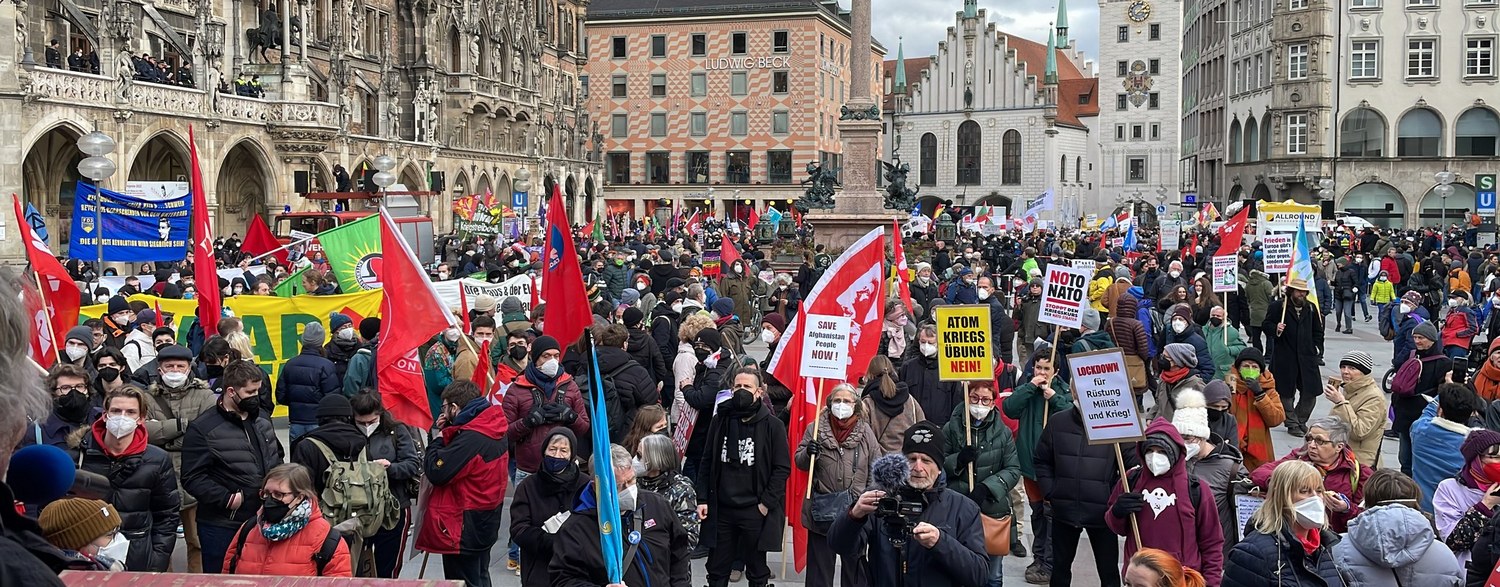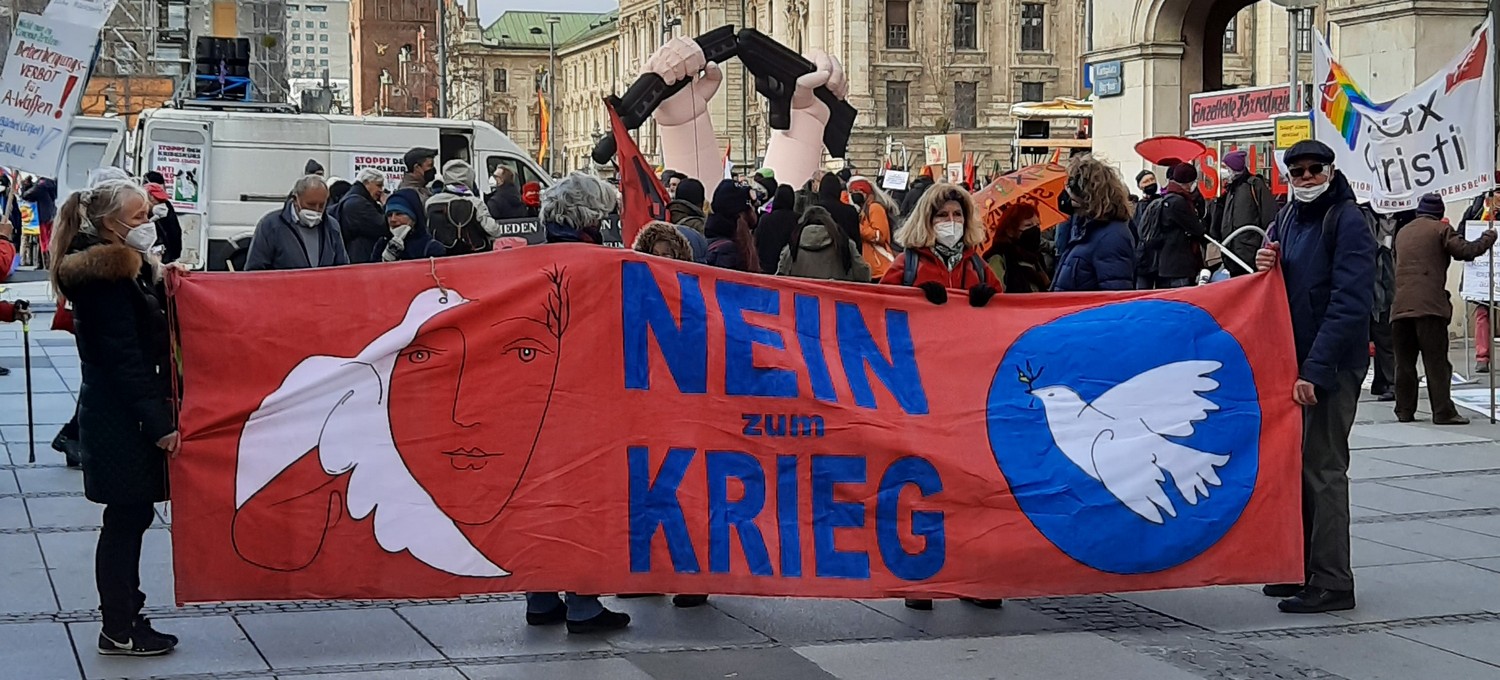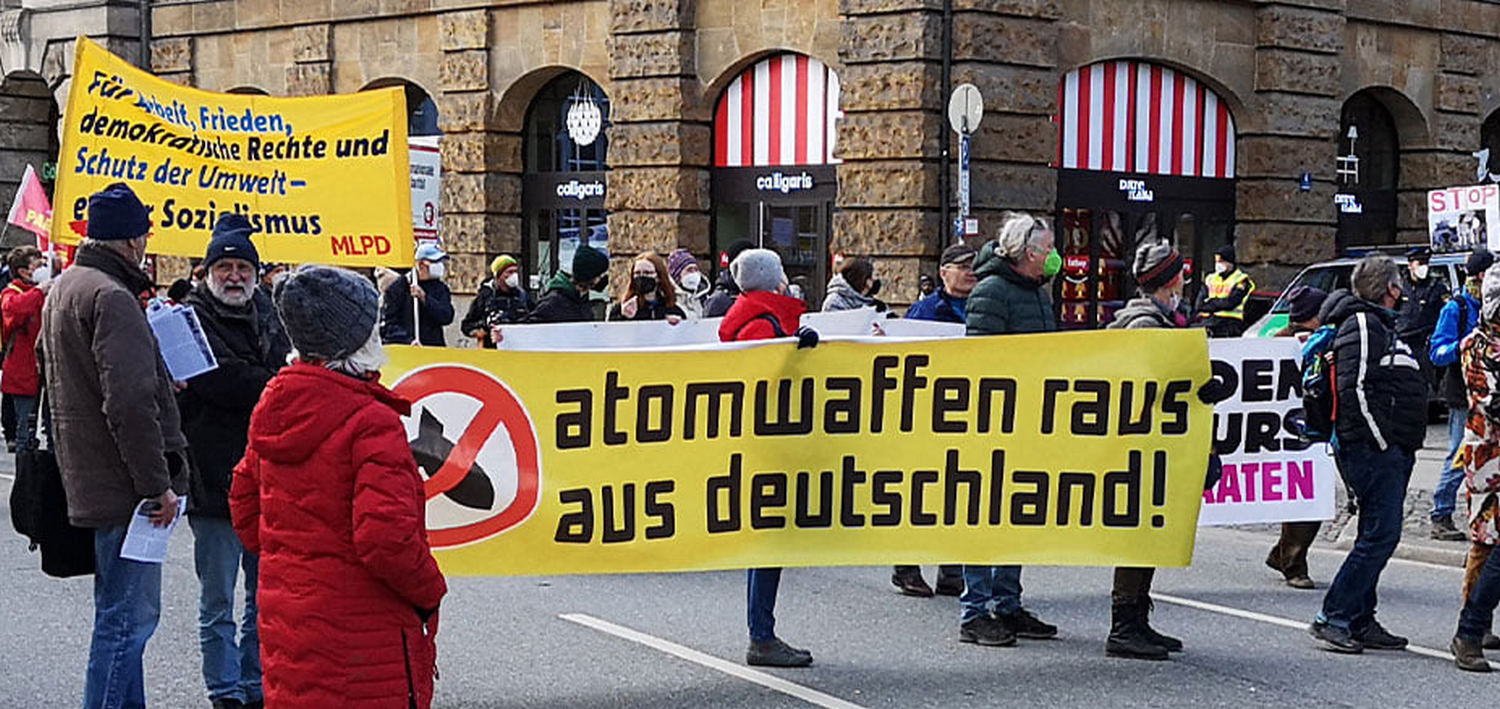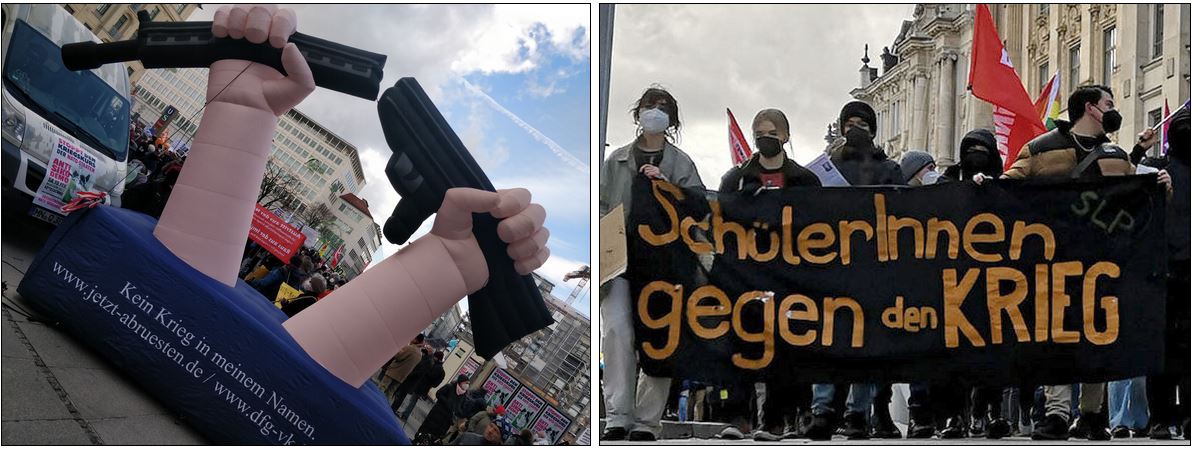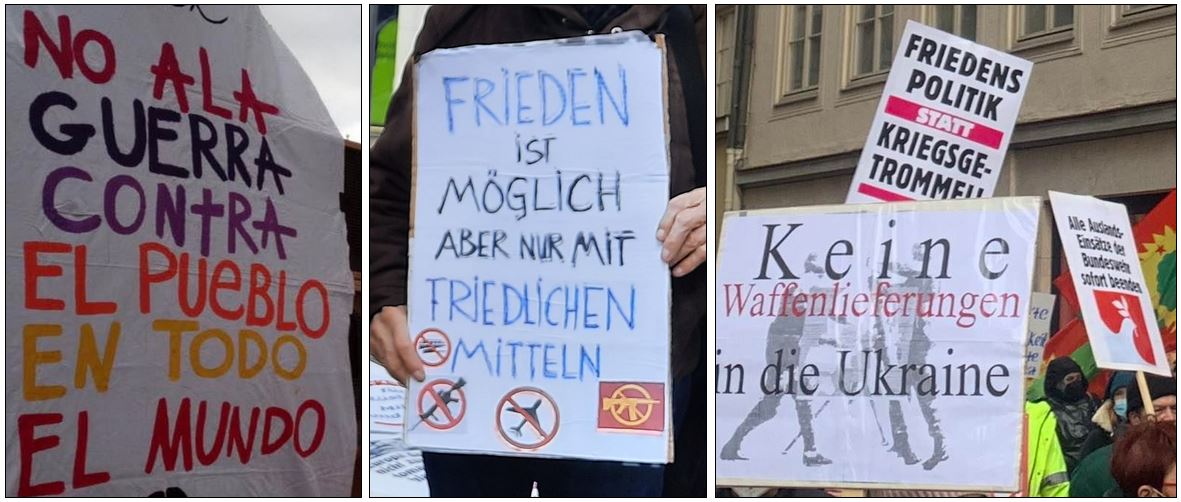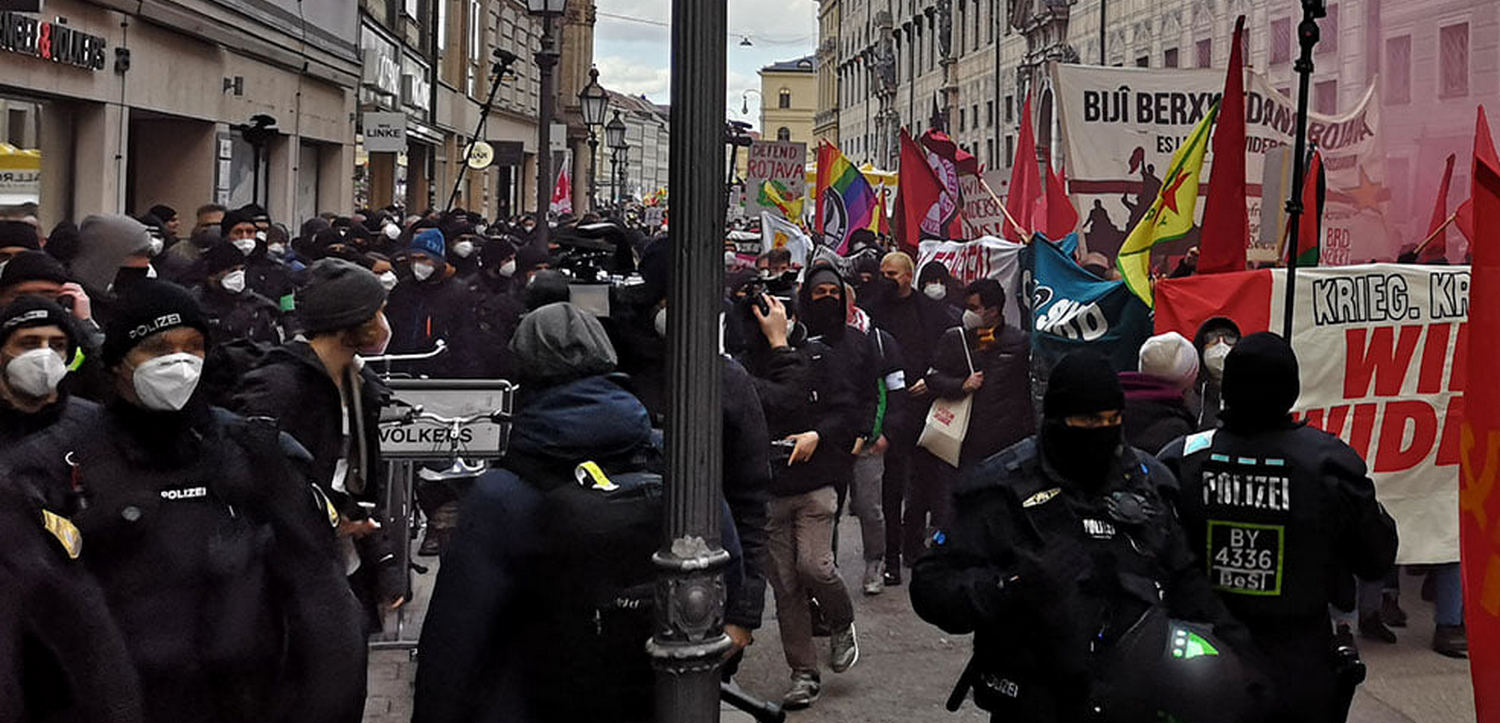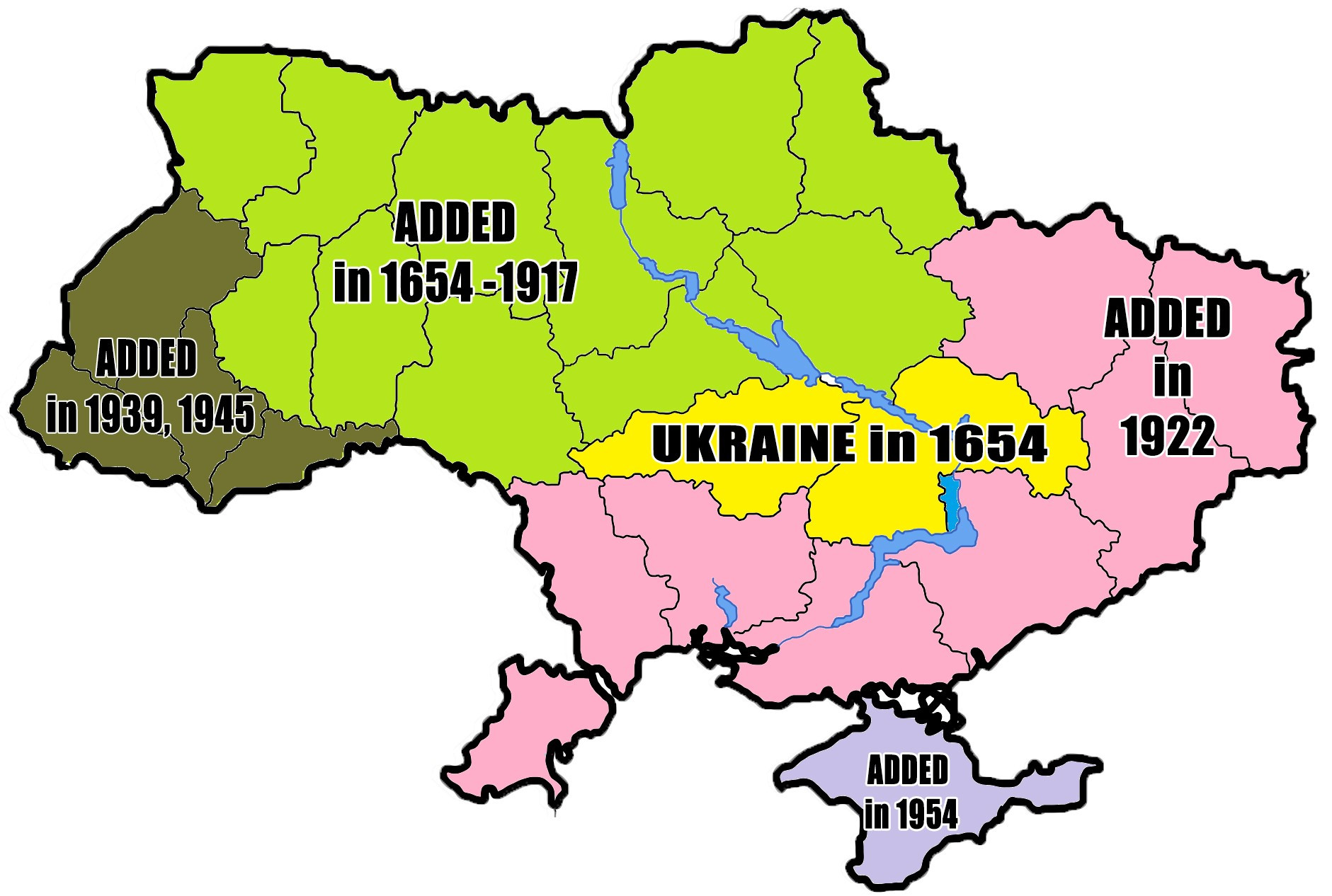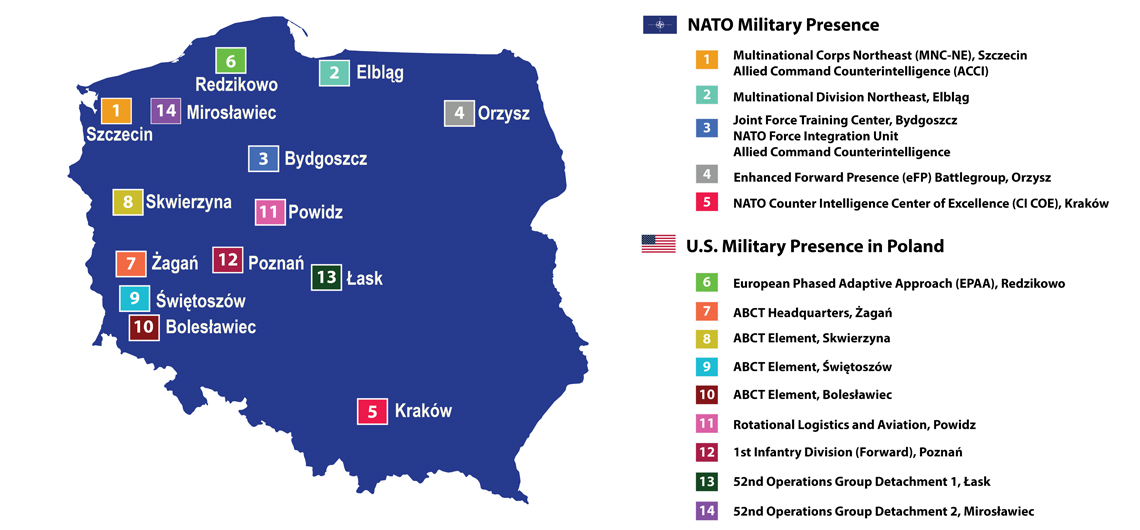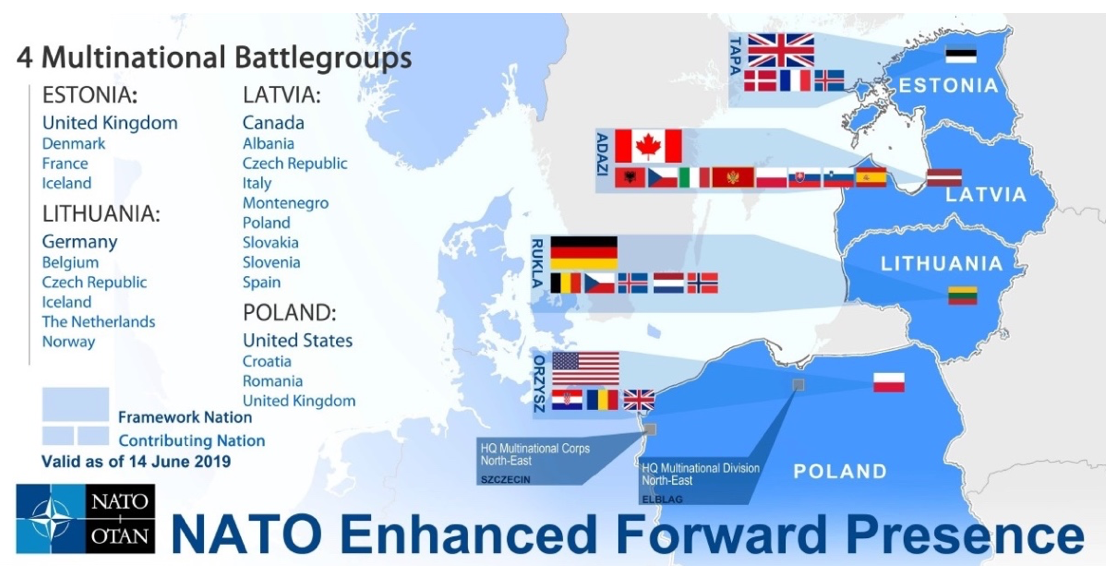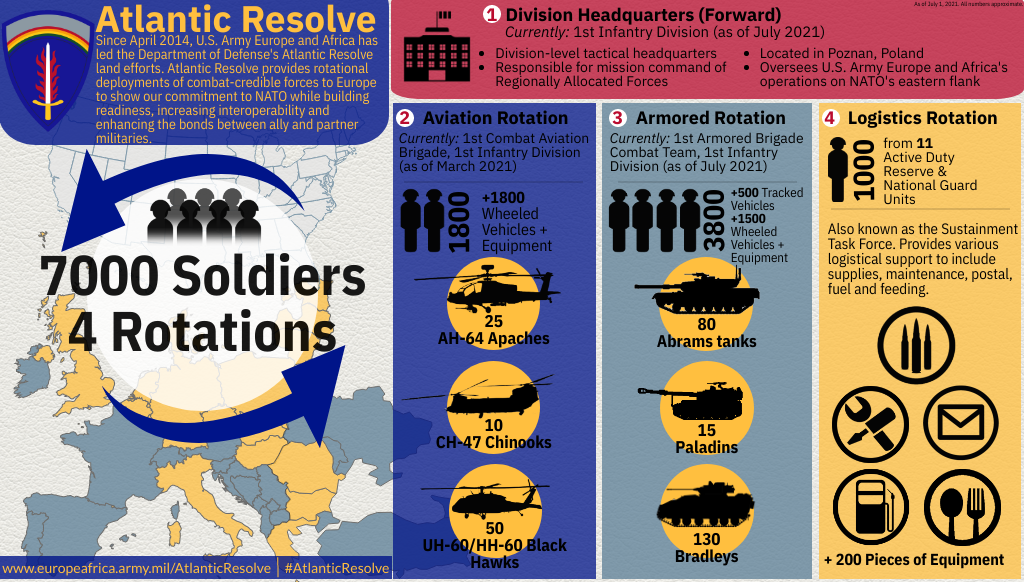No. 2
February 25, 2022
Crisis in Ukraine
Mass Demonstration at NATO War Conference in Munich, Germany
• Germans Reject Warmongers and Plans for War with Russia
From the Party Press
- TML
Daily, March 21, 2014 -
• Ukraine -- A Historical Sketch
• Crimea's
Declaration of Independence and Proclamation of
Sovereign Statehood
• Control of the Black Sea Basin Is Crucial to Russia's Economy and Security
For Your Information
Crisis in Ukraine
No to Plunging the Peoples of
Europe into a U.S./NATO-Provoked War!
All Out to Rally Canadians Against Warmongering,
Lies and Disinformation!
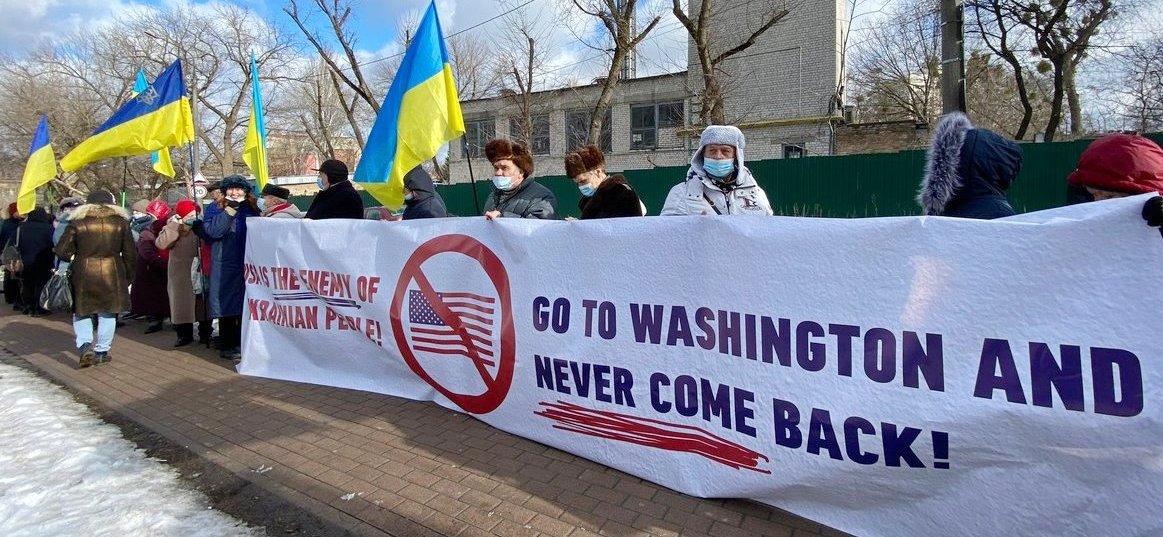

 Anti-war demonstration at U.S.
Embassy in Kyiv, February 9, 2022. Demonstrations took place in
Kyiv and different places around Europe in February against
NATO, including to coincide with the Munich Security Conference
meeting in Munich on February 19.
Anti-war demonstration at U.S.
Embassy in Kyiv, February 9, 2022. Demonstrations took place in
Kyiv and different places around Europe in February against
NATO, including to coincide with the Munich Security Conference
meeting in Munich on February 19.
Amidst all the warmongering, lies and disinformation over what Russia is or is not doing in Ukraine to defend its strategic interests, the obvious question arises as to who is threatening the peace in Europe? Is it Russia because it has taken pre-emptive action to defend its interests against the continuous escalation of the expansion of U.S. troops and bases and of U.S.-led NATO forces on Russia's borders? Or is it the United States and its aggressive military alliance NATO, which includes Canada, which have expanded their field of operation into eastern Europe threatening the very borders of Russia?
Russian President Putin said, "We've seen five waves of NATO expansion -- its military infrastructure has reached Russia's borders." This fact and its consequences is what the warmongering, lies and disinformation about what is going on with Ukraine deliberately fail to discuss.
In Canada a taboo is imposed on discussing NATO and Canada's membership in NATO. Any suggestion that it is not a force for peace is treated as extremist or “Russian disinformation.” Given the danger of all-out European war, it is urgent Canadians do not accept any limitations on their freedom of speech which they require to argue out what's what and what stand favours their interests and the interests of the peoples of the world.
In a statement issued on February 23, Prime Minister Justin Trudeau said Russia's actions are "unprovoked" and "a clear further violation of Ukraine's sovereignty and territorial integrity. They are also in violation of Russia's obligations under international law and the Charter of the United Nations."
He said, "Canada calls on Russia to immediately cease all hostile and provocative actions against Ukraine and withdraw all military and proxy forces from the country. Ukraine's sovereignty and territorial integrity must be respected and the Ukrainian people must be free to determine their own future."
Presenting the actions of the U.S., Canada and others as peaceful, unprovocative and supportive of Ukraine's sovereignty and territorial integrity is a commission of historical fraud. The so-called orange revolution instigated by the U.S., Canada and other collaborators in Ukraine to effect regime change, the arming and training of Ukrainian special forces, many of them from neo-Nazi militias and called "freedom fighters," overseeing their integration into the regular armed forces of Ukraine and inciting terrorist actions and "insurgencies" in eastern Ukraine's Donbass region are not the actions of forces whose motivation is the well-being of the peoples of Ukraine and Europe.
The greatest historical fraud and disinformation, however, is to leave the peoples of Ukraine and Europe out of the equation when speaking of war. Does the Prime Minister suppose that the European peoples who suffered terribly from Nazi-fascist occupation and crimes during World War Two are going to sit idly by as the jackboots of U.S., Canadian, German and other troops aligned with local neo-Nazi forces operate on their lands claiming high ideals?
The U.S. President Joe Biden, fresh from abandoning his NATO allies in Afghanistan and continuing to impose crippling sanctions on that country which, reports indicate, are causing mass hunger, disease and deprivation to the Afghan people, continues to shed tears over "blood-thirsty Russian acts." He clearly thinks he can get away with filling Ukraine and European countries with lethal weapons and special forces but remain unscathed. On the evening of February 23 he said: "The prayers of the entire world are with the people of Ukraine tonight as they suffer an unprovoked and unjustified attack by Russian military forces. President Putin has chosen a premeditated war that will bring a catastrophic loss of life and human suffering. Russia alone is responsible for the death and destruction this attack will bring, and the United States and its Allies and partners will respond in a united and decisive way. The world will hold Russia accountable."
Biden's impotence in the face of Russia's precision strikes which target only military infrastructure, air defence facilities, military aerodromes and aviation of the Ukrainian armed forces can be measured against the number of times he repeats the words blood and bloody when decrying Russia's response to ongoing U.S. brinkmanship.
The position of the U.S. is beyond farcical. In December, Secretary of State Antony Blinken, referring to Russia's concerns over its security and demands that Ukraine not join NATO and remain neutral, said: "One country does not have the right to dictate the policies of another or to tell that country with whom it may associate; one country does not have the right to exert a sphere of influence. That notion should be relegated to the dustbin of history."
This kind of statement which blatantly denies that it is the U.S. which dictates the policies all others should follow, is beyond even the lies about weapons of mass destruction it gave to justify its invasion of Iraq. It shows they think they can say whatever they like and there is nobody to hold them to account.
But history does not abide by such arrogant wishes and calculations. It has its own cunning and it is the peoples who make history when they intervene in a manner which defends their own interests within a situation. The demand to dismantle NATO and for all U.S. troops and bases and NATO special forces, trainers, advisors and troops to go home responds to historical necessity. The peoples have an interest to take stands which favour the resolution of conflicts on a peaceful basis and this requires demanding that NATO stop expanding and threatening Russia's borders. For the U.S. and NATO to say they favour diplomatic solutions and peace, when they put a gun to the head of entire countries, threaten their security and engage in terrorist actions, war and aggression to achieve regime change will not convince anyone that they are a force for peace.
The aim of the government of Canada, the U.S., NATO and their media is to isolate Russia. It is not to seek truth from facts and let people draw their own warranted conclusions.
In this vein, the CBC "reported:" "Russia launched a wide-ranging attack on Ukraine on Thursday, hitting cities and bases with airstrikes or shelling. Ukraine's government said Russian tanks and troops rolled across the border and accused Moscow of unleashing a 'full-scale war.'"
It illustrates how inflammatory rhetoric is called "news." A main feature is to make no attempt to report facts, but to selectively gloss over them so as to paint the picture their masters want painted. The mission of democratic media to report facts with the aim of getting to the heart of the matter and permitting readers to draw warranted conclusions has long since been trampled in the mud.
What Russia is doing Russia plainly states. Reports on the ground corroborate it. Russia said its military action is to demilitarize and de-nazify Ukraine. In a television address to the nation on February 24, Russian President Putin said: "The people's republics of Donbass approached Russia with a request for help. In connection therewith, I made the decision to hold a special military operation. Its goal is to protect the people that are subjected to abuse, genocide from the Kiev regime for eight years, and to this end we will seek to demilitarize and de-nazify Ukraine and put to justice those that committed numerous bloody crimes against peaceful people, including Russian nationals." The Russian Defence Ministry stated: "The Russian Armed Forces are not delivering artillery or air strikes against Ukrainian cities and are striking military infrastructure with precision weapons."
The Communist Party of Canada (Marxist-Leninist) calls on Canadians to oppose warmongering, lies and disinformation and reach warranted conclusions. No to plunging the peoples of Europe and Eurasia into a U.S./NATO-provoked war! Call for NATO to withdraw from Eastern Europe and for it to be dismantled! Oppose the warmongering of Canada's government and cartel parties in the Parliament!
All Out to Make Canada a Zone for Peace!
Mass Demonstration at NATO War Conference in Munich, Germany
Germans Reject Warmongers and
Plans for
War with Russia
On February 19, German anti-war and peace organizations held a mass action in Munich to oppose the annual Munich Security Conference (MSC). Anti-war activists describe it as a war conference and PR event for the aggressive NATO alliance, and a means to justify the billions spent on arms by Germany and the EU and their war missions, which they sell to the population as "peace missions."
Some 3,000 people took part in a rally and march around Hotel Bayerischer Hof where the war conference was taking place. In the evening, activists held the Munich International Peace Conference at old city hall.
In the call for the protest, the anti-war activists reject increased military spending by Germany, the stationing of U.S. nuclear weapons on German territory, and the overall arms build-up in the EU. They state, "The increasing militarization of Germany and the EU does not serve peace, nor does the extremely dangerous course of confrontation, the war rhetoric and war manoeuvres against Russia and the People's Republic of China, which can escalate militarily at any time and lead to war between the nuclear powers.
 "This policy of confrontation
must end. Peace in Europe and in the world can only exist with
and not against Russia and China. Instead of violent enforcement
of great power and supremacy interests, disarmament and
international cooperation would be the order of the day."
"This policy of confrontation
must end. Peace in Europe and in the world can only exist with
and not against Russia and China. Instead of violent enforcement
of great power and supremacy interests, disarmament and
international cooperation would be the order of the day."
They issued these specific demands:
"Downgrade instead of upgrade! Instead of wasting billions on rearmament and war preparations, our tax money must be invested in the social systems, health and education systems and in climate protection.
"We demand the termination of all foreign deployments of the Bundeswehr [German Armed Forces], Germany's withdrawal from the NATO war alliance and all military structures of the EU. No participation in EU rearmament projects. No acquisition of armed drones.
"German support for wars of aggression that violate international law and illegal drone warfare conducted via the U.S. airbase in Ramstein must stop. All U.S. and NATO troop bases in Germany and all U.S. and NATO command centres must be closed.
"No more involvement in the U.S. nuclear war strategy. No purchase of U.S. fighter jets for the use of nuclear weapons stationed in Germany. The federal government must accede to the UN nuclear weapons ban treaty and terminate the stationing of U.S. nuclear weapons in Büchel."
Germany ranks as the fourth largest arms exporter in the world, they point out, contributing to conflict and wars around the world.
They also point out German and EU responsibility for the global refugee crisis by contributing to wars, climate change, poverty and other problems that cause millions to flee their homelands, and then refusing asylum to all but a few seeking refuge. They write:
"Unjust economic and trade relations, sanctions and war are destroying the livelihoods of countries in the Global South. But Germany and the EU are sealing themselves off, driving back refugees illegally in violation of human rights, and allowing thousands to drown in the Mediterranean every year. We cannot accept that.
"No more exploitative economic policies that cause wars, poverty and displacement. Our solidarity belongs to the refugees, especially those fleeing the wars waged with German weapons. Flight is not a crime. No one is illegal."
The call for action ends with by highlighting the needs of the youth for a bright future, while decrying their recruitment as canon fodder in wars of aggression. They write:
"The peace movement and progressive youth organizations have been protesting against a lack of prospects and war for years. While there is less and less job security, working conditions are getting worse and real wages are falling, the Bundeswehr presents itself as an attractive employer and appears in schools, at trade fairs and on social media. It lures with a fascination with technology and places to study and train. That has to stop! The youth should not be wasted in war!
"That's why we demand: Education not bombs! No advertising for death! More civilian training places and better working and training conditions!"
Anti-NATO Demonstrations Held in Other Places

Demonstration against NATO and warmongering in Ukraine,
New York City, February 19, 2022.
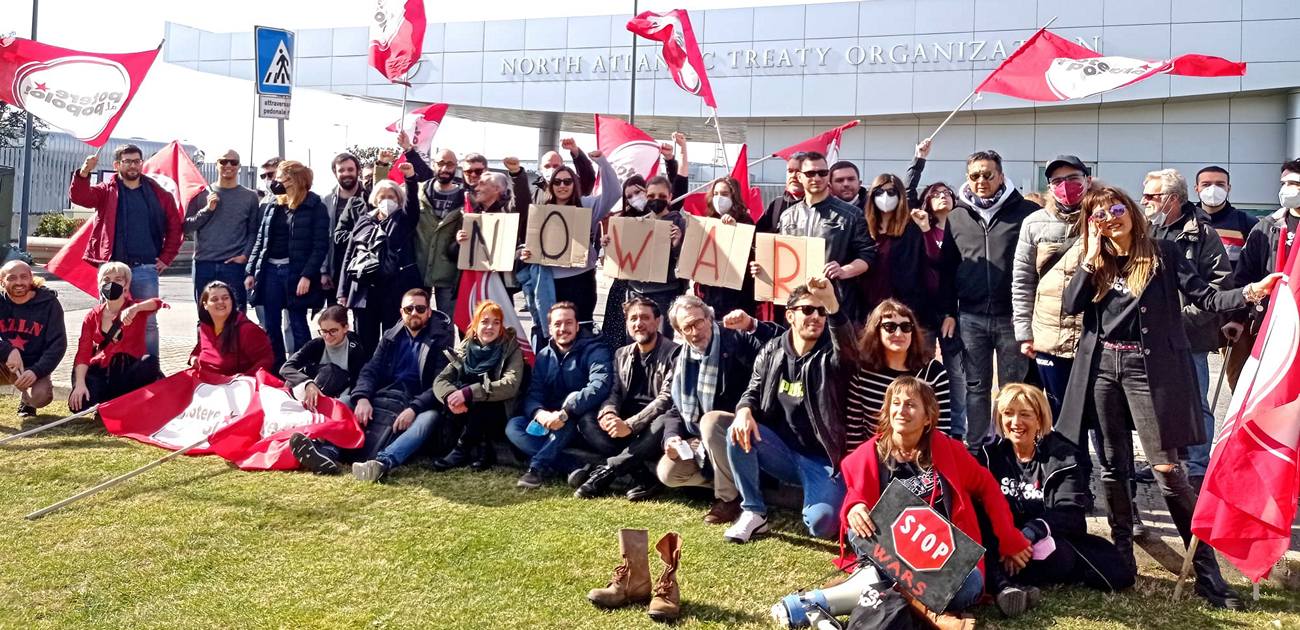
Anti-war demonstration outside NATO command centre in Naples,
Italy, February 19, 2022.
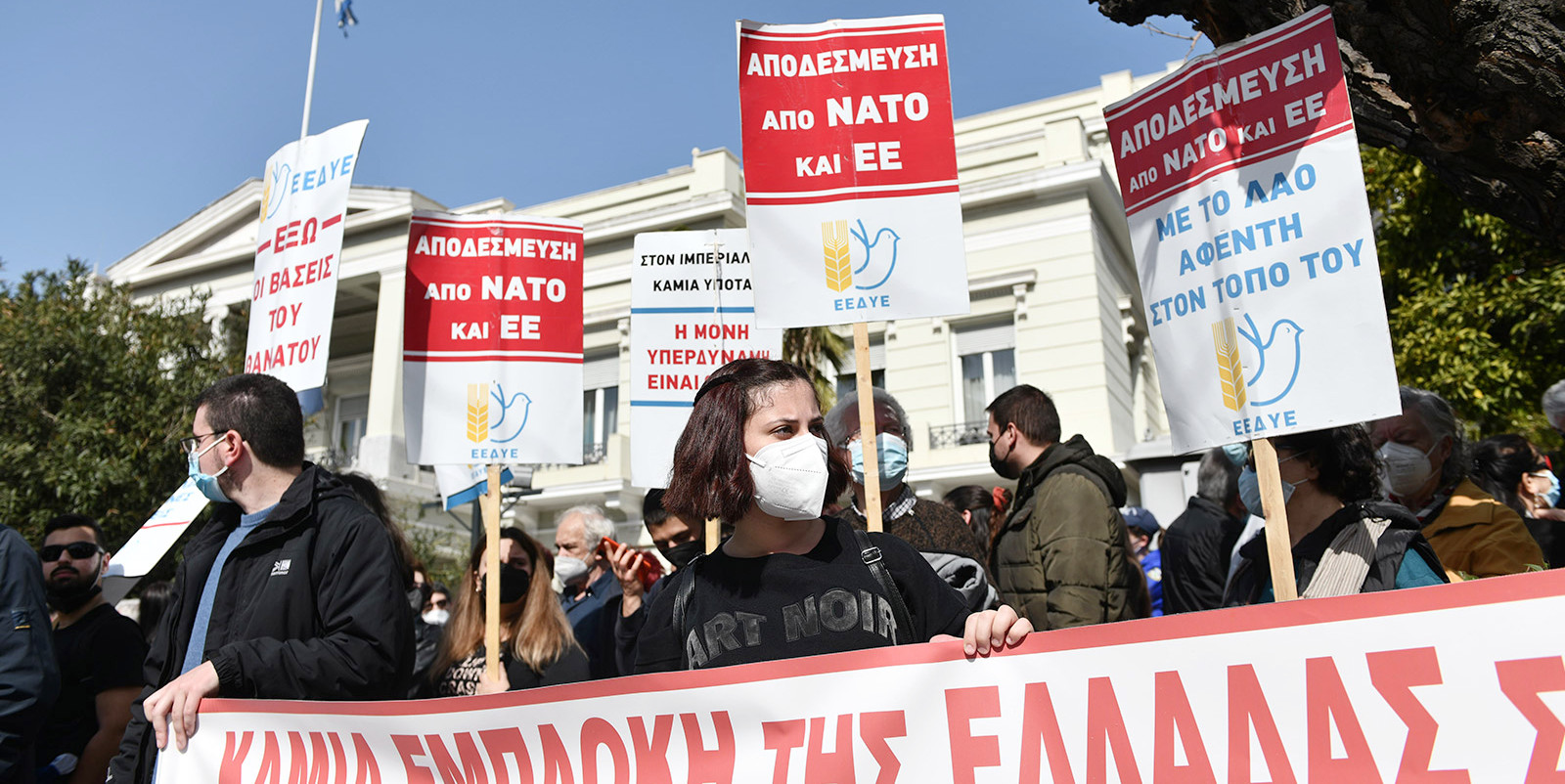
Protest, February 21, 2022, outside Greek ministry of
foreign affairs demands Greece get out of NATO and not
participate in a war in Ukraine.
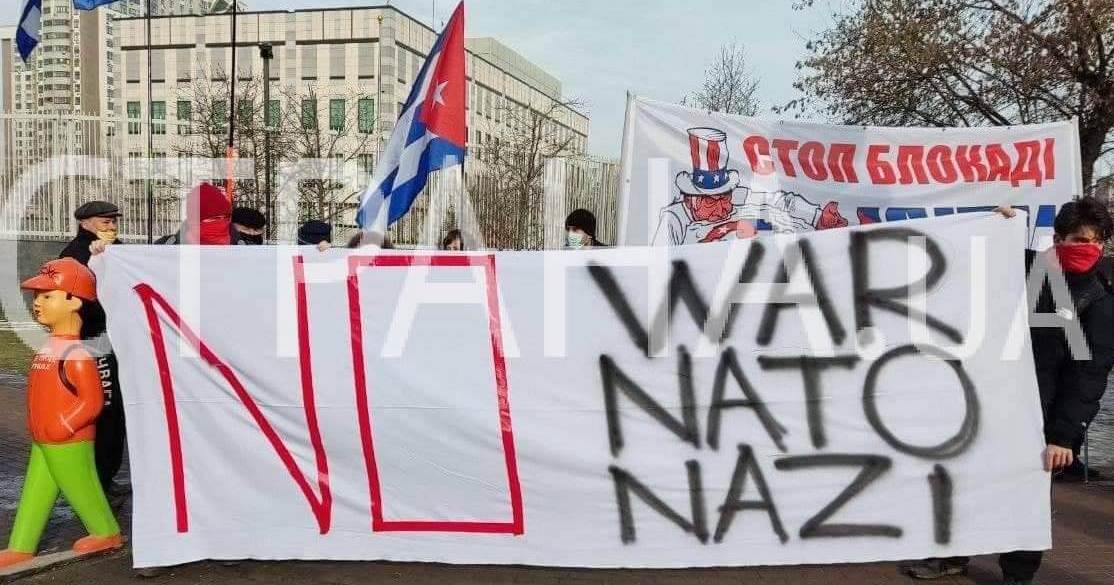
February 17, 2022 action at the U.S. embassy in Kyiv that
includes the participation of Cuba solidarity activists.
(Translation of German quotations by TML. Photos: ATIK Haber, Die Linke Bayern, AntiSiko, T. Mohr)
From the Party Press
- TML Daily March 21, 2014 -
Ukraine -- A Historical Sketch
This article by Nathan J. Freeman was original published by TML Daily on March 21, 2014 under the title "What is the Trouble and Who Are the Troublemakers?"
The cunning of history has positioned Ukraine as the latest country in which post-Soviet Russia and U.S.-led imperialism confront each other. The U.S.-led camp, which includes the old European colonialism, is on a rampage. The Russian government has responded in a measured way, securing its naval assets in the Crimea and going so far as to take Crimea out of the clutches of the fascist coup that seized power in Kiev while putting the elected president, Viktor Yanukovych, to flight.
Beyond and underlying the inter-monopoly contradictions (mainly over energy resources access and control [1]) that are at odds and in play at this time in that region, the longest-standing and most burning issue for the peoples of this region has surfaced once again: how can the equality and sovereign rights of nations and peoples, irrespective of their ethnic makeup, be established (and in some respects re-established) with a guarantee that is meaningful under current conditions? Only as a constituent founding republic of the Union of Soviet Socialist Republics in 1922 did Ukraine finally became a nation-state embracing all the Ukrainian-speaking ethnos. Regardless of the decades of imperialist propaganda before and during the Cold War dismissing Ukraine as a puppet of Moscow and its people starved of rights etc., it was the USSR itself, with its constitutional provision upholding the right to secede from the Union, that provided the first-ever guarantee of Ukraine's independence. Indeed, Ukraine was one of the few founding Soviet republics to enjoy its own seat at the United Nations.
Economically, during the Soviet period, the Ukrainian working class transformed their country from an agricultural colony to an agro-industrial economy supplying the coal industry that fuelled industrial development throughout the Soviet Union, to an industrial-agricultural economy participating as an exporter of specialized heavy industrial machinery and advanced pharmaceuticals into world markets. Today [2014], under the stewardship of Arsenii Yatseniuk, a previously-unheard-of private banker, Ukraine is bankrupt and a report has even appeared -- so far uncontradicted -- that its national treasury was put on a plane to New York the day after the recent Right Sector-Svoboda coup in Kiev and is now in the custody of the Federal Reserve Bank of New York in Manhattan.
Ethnographically speaking, it is widely accepted down to the present that the Russian ethnos and some of the Ukrainian ethnoses share a common origin. For the period preceding the emergence in the Ukrainian region of the Cossacks and their hetman system of governance at the height of the European Middle Ages, a complete and verifiable catalog of all the original peoples of Ukraine remains in dispute.
Notwithstanding this academic fact, nevertheless, it is widely accepted that, earlier in the Middle Ages, the probably originating portion of the Russian ethnos emerged from what became known as the Kievan Rus. This was a collection of settlements in the region of present-day Kiev. In other words, the emergence of part of what becomes a distinct Russian ethnos begins in Ukraine about a millennium ago.
As far as social and political organization goes, however, before the middle third of the 19th century, there existed neither an abstract conception of a Ukrainian nation nor of a Ukrainian territory peopled predominantly by a single Ukrainian ethnos.[2] The principle of a Ukrainian nation was elaborated in the middle of the 19th century by a movement of intellectuals led by Taras Shevchenko. His was effectively the founding voice of modern Ukrainian national literature and culture. On the one hand, standing up for a Ukrainian nation energized the mass resistance of the peoples particularly of western Ukraine against the annexationist efforts of the Polish monarchy and the Austro-Hungarian Empire.[3] On the other hand, the growth of the struggle for full Ukrainian national autonomy encountered a serious challenge from the social and economic conditions prevailing, and rapidly deteriorating, in eastern Ukraine (some of which was already effectively Russian). There the national question confronted a profound socio-economic challenge, deriving from the Russian landowners' pressure in this period -- in eastern Ukraine and throughout Russia -- to "en-serf" the peasants and deprive them ultimately of any legal rights to work any land of their own or for their own family's account.[4] In the years immediately following its defeat in the Crimean War, the halting and indecisive character of Tsarism's attempts at "reform from above" was not unexpected.
After eliminating serfdom in 1861, however, the failure of Tsar Alexander to allow the peasants to own and work land on their own, independent of the whims of the nobility or other landowners, greatly boosted the Ukrainian national movement along with all the other centrifugal forces tearing at the absolutism of tsarist autocracy.
Meanwhile, the stage in which the various movements for national autonomy from Tsarist autocracy inside imperial Russia eventually found their footing would emerge during the First World War. The Russian peasantry were conscripted in their hundreds of thousands to die like flies under heavy German shellfire. By the end of 1916, the armies of Britain (plus its soldiery from Canada and other colonies) and France had been bled to a point of near collapse. At the same time, the two-million-man army of the Tsar, which was supposed to be the Entente powers' ace-in-the-hole against Germany, more or less collapsed and ceased to play any strategically consequential role in the conduct of the war.[5]
The official Soviet account for decades repeated the view that the USSR was the guarantor of a self-determining Ukrainian nation-state. Its correctness was demonstrated dramatically once again, this time by negative example, with the first so-called "Orange Revolution" imposed in 2004 via a coalition of neo-fascists and neo-liberals instigated and propped up by the George W. Bush administration that seized power in Kiev through mass demonstrations in the city's central Maidan Square. Ten years later under the Obama administration, the latest coup took place along many of the same lines. Once again, it is the Ukrainian people's turn to settle the question of what is the trouble and who are the troublemakers on the front of their national sovereignty. Only their movement and struggle can take away the war-threatening power of the U.S. and EU imperialists on the one hand and restore brotherly relations of equality and mutual benefit with their neighbours the Russian people on the other.
Notes
1. The map below illustrates the network of Russian natural gas pipelines to southern Europe, including southeastern Germany, that go through Ukraine's territory. (There are other Russian pipelines that go directly to northern Germany and Scandinavia.) Russian gas currently provides 30 per cent of the heating and industrial needs of Germany.
2. Since the French Revolution, one of the greatest damages wrought by Eurocentric thinking stems from the assumption that the one nation-one country pattern -- which an extremely short list of countries in western Europe happen to have enjoyed always and everywhere -- represents the true direction towards which all the rest of humanity ought to strive.
3. These powers sought to expand their control over this region, which they called "Eastern Galicia." This designation came from schemes that they hatched with the Russian tsar that came to fruition during the 1770s, in which the territory of Poland was partitioned among Russia, Vienna and Warsaw. This, and the background of its development in the preceding couple of centuries, is examined in detail in Michael Hrushevsky, A History of Ukraine (Yale University Press 1941), Chapters 21-23.
4. The shattering defeat suffered by Russia in the Crimean War strengthened the hand of a faction at the Tsar's court seeking to reform the administration (including especially tax collection) of the lands worked by enserfed peasants. The leading faction in the national movement in western Ukraine thought these "modernizers" could be their silent ally in eastern Ukraine, standing in between the Ukrainian national movement and the Tsar. See Orest Subtelny, Ukraine: A History (University of Toronto Press, 1989), Part Four "Ukraine Under Imperial Rule."
5. With the launch of the revolution in Petrograd in March 1917, hundreds of thousands of Russian soldiers fled the front lines of the war for home. With the Bolshevik victory in October/November, Russia was completely out of the war. The Entente powers quickly assembled a counter-revolutionary army to attack and destroy the Bolshevik victory. The peasantry from various Ukrainian regions controlled by Poland and the Austro-Hungarian Empire were initially recruited for the armies of Kolchak and Denikin, the Russian Tsarist officers leading the counter-revolutionary war. See Vasyl Kuchabsky, Western Ukraine in Conflict with Poland and Bolshevism 1918-23 (Edmonton AB: Canadian Institute of Ukrainian Studies Press, 2009 -- first English translation of the 1934 German edition)
The system under the antisocialist Hetman Ukrainian government formed after the coup d'état of General Pavlo Skoropadsky in Kyiv on 29 April 1918, during which the congress of the conservative All-Ukrainian Union of Landowners proclaimed Skoropadsky hetman of Ukraine. This coup was backed by the generals of the German and Austrian armies that occupied Ukraine after the Peace Treaty of Brest-Litovsk and by former tsarist officers.
Crimea's Declaration of Independence and Proclamation of Sovereign Statehood
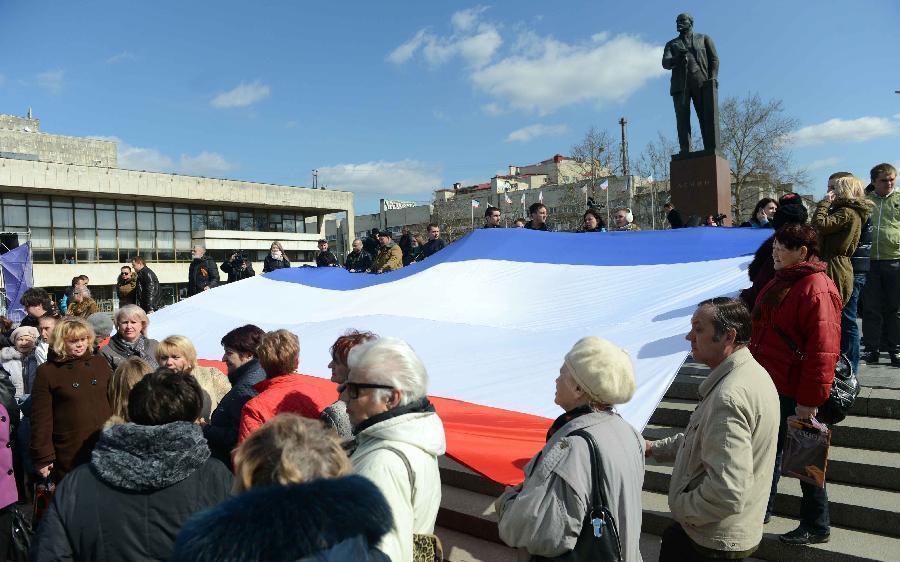
Crimean people celebrate being accepted as part of the Russian
Federation in Simferopol, the Republic of Crimea, March 18,
2014.
In a referendum held on March 16, 2014, citizens of Crimea voted to secede from Ukraine and join the Russian Federation. According to official data, Russians constituted 58.32 per cent of the population of Crimea, 24.32 per cent were Ukrainians and 12.10 per cent were Crimean Tatars. TML Daily wrote at the time:
Despite western media hysteria that the non-Russian population of the Crimea -- Crimean Tatars and Ukrainian nationals, which constitute 41.7 per cent of the Crimean population -- would either not vote or be bullied under military occupation, the election was said to be conducted with due respect for the expectations of a free election. Reports say that 83.1 per cent of eligible Crimean voters cast their ballot in the March 16th referendum. The final tally of the vote was 96.77 per cent in favour of joining the Russian Federation, and 2.51 per cent against.
On March 17, the U.S. State Department and European Union imposed sanctions on government authorities and deputies claiming that the vote violated the Constitution of Ukraine. Seven Russians were included on the so-called black list of the U.S. Department of State, including the Chairwoman of the Federation Council (Senate) Valentina Matviyenko, senator Andrei Klishas, and deputies Elena Mizulina and Leonid Slutski. The Deputy Prime Minister Dmitri Rogozin and Kremlin advisor Sergei Glasev were also included on the list. Similar measures of visa restrictions and freezing of bank accounts were adopted by the European Union against 13 Russian citizens and eight Crimean government officials and parliamentarians.
The G7 as well as the European Council and the European Commission also issued a joint statement on March 2, attacking Russia's position on Ukraine and declaring suspension of preparations for a G8 summit scheduled for June in the Russian resort city of Sochi.
Despite this, the Russian parliament signed a treaty accepting Crimea as part of the Russian Federation. Deputies of the Duma (Lower Chamber) denounced the reprisals saying they are convinced the measures have no relation to the Crimea issue, but to their country's positions which are independent from those of the U.S. and EU.
(Photo: Xinhua)
Control of the Black Sea Basin Is Crucial to Russia's Economy and Security
On March 18, 2014 Russia and Crimea signed a treaty which gave the Russian Federation control over the Black Sea as well as the Sea of Azov, the west coastline of which borders on Eastern Ukraine and the Donetsk region. The agreement was announced by Russian President Putin who said two "constituent regions" of Crimea were to join the Russian Federation: the "Republic of Crimea" and the "City of Sevastopol," both with the status of autonomous regions.
The status of Sevastopol as an autonomous entity separate from Crimea is related to the location of Russia's naval base in Sevastopol. After the break-up of the Soviet Union, Russia retained its naval base in Sevastopol under a bilateral agreement with Ukraine according to which the naval base was within Ukraine under a lease agreement. With the signing of the March 18th treaty, that agreement became null and void. Sevastopol including the Russian naval base became part of an autonomous region within the Russian Federation and Crimea's coastline and territorial waters henceforth belonged to the Russian Federation.
As a result, Russia now formally controls a much larger portion of the Black Sea. The Eastern part of Crimea -- including the Kerch straits -- are now under Russia's jurisdiction and control. On the Eastern side of the Kerch straits is Russia's Krasnodar region and extending southwards are the port cities of Novorossiysk and Sochi.
Novorossiysk is also strategic. It is Russia's largest commercial port on the Black Sea, at the cross-roads of major oil and gas pipelines between the Black Sea and Caspian Sea.
Historically, the Kerch straits which constitute a gateway from the Black Sea to Russia's major waterways including the Don and the Volga rivers, have played a strategic role.
During World War II, the Kerch peninsula was an important point of transit by land and water. It was occupied by Nazi Germany and taken back by the Red Army. In the coldest months of winter, it became an ice bridge linking Crimea to the Krasnodar region.
The Kerch straits are about five kilometres in length and 4.5 kilometres wide at the narrowest point between the tip of Eastern Crimea and the Taman Peninsula. Kerch is a major commercial port linked to railway, ferry and river routes.
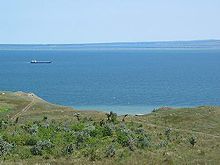

Kerch straits: photo taken
from Crimean side (left); aerial view of straits shows their
narrow width (right)
The Sea of Azov
The Kerch Straits also link the Black Sea to the Sea of Azov. The Sea of Azov connects with the Don River and the Volga, through the Volga Don Canal. In turn, the Volga flows into the Caspian sea.The Kerch-Yenikalskiy Canal allows large (ocean) vessels to transit from the Black sea to the Sea of Azov.
The Kerch Straits also link the Black Sea to the Volga, which in turn connects to the Moscow River through the Moscow Canal.
In December 2013 Moscow signed a bilateral agreement with the Yanukovych government in Kiev pertaining to the construction of a bridge across the Kerch Straits, connecting Eastern Crimea (which was part of Ukraine) with Russia's Krasnodar region. [Called the Crimean Bridge, the link became operational for road transport in 2018, opened to passenger trains at the end of 2019, and commenced carrying freight trains in 2020 -- Ed Note].
For Your Information
Some Facts
On February 25 a spokesperson for the Russian Ministry of Defence informed that its Armed Forces disabled 118 military facilities in Ukraine as part of the operation that began the day before. This included 11 airfields, 13 command posts and communication centres, 14 S-300 and Osa anti-aircraft missile systems and 36 radar systems. As well, five combat aircraft, one helicopter, five drones, 18 tanks and other armoured combat vehicles, seven multiple rocket launch systems, 41 units of special military vehicles and five warships were destroyed or otherwise disabled.
The Ministry also informed that 150 servicemen from different Ukrainian units laid down their arms and surrendered during fighting in Donbass. It was also reported that in the early hours of Friday Ukrainian forces shot down a plane over Kiev which then crashed into a residential building, setting off a fire.
The UN agency for refugees on February 25 said more than 50,000 Ukrainians have fled their country in less than 48 hours since the start of the Russian military operation. The agency calculates that there are 100,000 displaced people inside Ukraine.
NATO's Response
NATO Secretary General Jens Stoltenberg engaged in warmongering second to none. On February 24 he accused Russia of "shattering the peace on the European continent," calling its actions "a deliberate, cold-blooded and long-planned invasion." "Russia is using force to try to rewrite history," he said, to cover up that it is the U.S. and NATO who have been using force to impose their will and striving to take over Europe and dominate Asia, starting with the dismemberment and bombing of Yugoslavia, the invasion of Iraq under the false pretext of weapons of mass destruction, the death and destruction wreaked on Afghanistan, the destruction of Libya, attempts to destroy Syria and so on down the line.
After the start of the Russian military operation in Ukraine,
NATO began to deploy elements of its rapid reaction force to
further strengthen its defense posture, on the territories of
member countries of the Alliance (and not in Ukraine). "We are
deploying for the first time the Collective Defence Response
Force to avoid overspills on the territory of the
Alliance,” NATO Secretary General Jens Stoltenberg said,
after a summit of Alliance leaders organized by videoconference.
He also claimed that "Ukrainian forces are fighting bravely and
are able to inflict damage on Russian forces invading them." For
his full statement, click
here.
There are other reports that "Some NATO members have also sent troops, aircraft and warships to the Black Sea region, near allies Bulgaria, Romania and Turkey. The Pentagon has also put up to 8,500 U.S. troops on heightened alert, so they will be prepared to deploy if needed to reassure other allies."
The fact is that NATO ranks are not at all of one mind because the interests of countries such as France and Germany do not accord with those of the U.S. imperialists, no matter what strong-arm tactics are used against them to comply with troop movements and sanctions against Russia.
Estonia, Latvia, Lithuania and Poland requested a NATO meeting
under Article 4 of the founding treaty of the aggressive
U.S.-led military alliance. Article 4 says such a meeting is
triggered when "the territorial integrity, political
independence or security of any of the [NATO] parties is
threatened."
Meanwhile, Estonia, Latvia and Lithuania issued a joint
statement which said: "We would need to urgently provide
Ukrainian people with weapons, ammunition and any other kind of
military support to defend itself as well as economic, financial
and political assistance and support, humanitarian aid." Given
that Russia already decisively responded to the stashes of such
weapons, ammunition and other military support provided by the
U.S., Canada and others, this statement will not amount to much.
German soldiers comprise about half of a 1,100-strong NATO battle group in Lithuania that includes troops from Belgium, the Czech Republic, Luxembourg, the Netherlands and Norway.
German Defence Minister Christine Lambrecht told a joint news conference with her Lithuanian counterpart at the Rukla military base that more German troops could be sent. "It is clear that we need to apply stricter deterrence measures," Lambrecht said. "I want to underscore that we are ready to send more troops, land and air. We are ready to send more troops also to Lithuania...," she said. These proposed reinforcements come on top of a contingent of some 360 extra German soldiers already en route to Lithuania, she said.
Norway also announced that it was adding 50-60 soldiers to the NATO battlegroup in Lithuania.
Separately, UK Prime Minister Boris Johnson said 800 British soldiers were being added to the NATO battlegroup in Estonia, and that more could be sent "to help protect allies if NATO makes a request." UK and Baltic states' troops will participate in "preventative and proportionate" exercises "at sea, on land, and in the air," the U.K. said.
British Defence Minister Ben Wallace then announced that a separate group, the Joint Expeditionary Force (JEF), which includes the UK, Denmark, Estonia, Finland, Iceland, Latvia, Lithuania, the Netherlands, Norway and Sweden, would soon be engaging in military exercises "in northern Europe."
The expected reinforcements will drastically increase the amount of NATO troops in Latvia, Lithuania, and Estonia, to about 6,000, the German broadcaster Deutsche Welle wrote on February 22.
In the second week of February, around 4,600 U.S. paratroopers from the 82nd Airborne Division landed in Poland followed by eight U.S. F-15 combat aircraft which landed at the Lask airbase "to help patrol the skies of the Baltic states." Earlier, the U.S. Air Force also deployed F-16 jets to Poland. The aircraft are to "strengthen NATO's eastern flank" as part of its "air policing" mission. It is reported that Estonia, Lithuania and Latvia lack warplanes capable of patrolling their airspace. The U.S. mission is currently in its 58th deployment, with Poland contributing its Orlik contingent for the 10th time.
On February 24 Biden announced the U.S. was sending 7,000 more troops to Germany. Other new deployments have been announced recently as well, including: six more F-35 fighter jets to join the 24 F-15s and F-16s in Poland and Romania involved in NATO's "enhanced air policing missions," over the Baltic region and the Black Sea region; two B-52 bombers deployed over the Arctic and Baltic Sea; paratroopers from the 173rd Airborne Brigade deployed to Latvia along with hundreds of additional infantry troops to work with that country's military "on behalf of U.S. security interests."
Canada announced this week that it was deploying 460 additional troops to Latvia and to the surrounding region. It already has 540 troops and commands a multinational NATO battalion in Latvia. Canada has also put 3,400 troops on standby for deployment to Europe "in case of need." Meanwhile Minister of Defence Anita Anand said in response to a reporter's question on February 24 that in addition to the lethal weapons Canada provided Ukraine earlier this month, further shipments, including the anti-aircraft systems Ukraine is seeking, are under consideration.
For February 25, 2022 statement by NATO Heads of State and Government "on Russia's Attack on Ukraine," click here.
US and NATO Presence in Poland
Note
1. Fast facts on overseas U.S. military outposts:
There are approximately 750 U.S. military base sites abroad in 80 countries and colonies.
The United States has nearly three times as many bases abroad (750) as U.S. embassies, consulates, and missions worldwide (276).
While there are approximately half as many installations as at the Cold War's end, U.S. bases have spread to twice as many countries and colonies (from 40 to 80) in the same time, with large concentrations of facilities in the Middle East, East Asia, parts of Europe, and Africa.
The United States has at least three times as many overseas bases as all other countries combined.
U.S. bases abroad cost taxpayers an estimated $55 billion annually.
Construction of military infrastructure abroad has cost taxpayers at least $70 billion since 2000, and could total well over $100 billion.
Bases abroad have helped the United States launch wars and other combat operations in at least 25 countries since 2001.
U.S. installations are found in at least 38 non-democratic countries and colonies.
(Images: Anti-Bellum)
Who Said What
China said the U.S. has been sending weapons to Ukraine, heightening tensions, creating panic and even hyping up the possibility of warfare, Xinhua reported. "A key question here is what role the U.S., the culprit of current tensions surrounding Ukraine, has played. If someone keeps pouring oil on the flame while accusing others of not doing their best to put out the fire, such kind of behavior is clearly irresponsible and immoral," China said.
Prior to February 24 events, China said that the legitimate security concerns of any country should be respected and the purposes and principles of the UN Charter should be jointly upheld. What has happened on the Ukraine issue has much to do with the long delay in the effective implementation of the Minsk-2 agreement, China said. China will continue to engage all parties based on the merits of the matter itself. It once again calls on all parties to exercise restraint, appreciate the importance of implementing the principle of indivisible security and de-escalate the situation and resolve differences through dialogue and negotiations.
At the time of the opening of the Winter Olympics in Beijing, Russia and China signed multiple agreements as follows:
- agreement on cooperation in anti-monopoly legislation and competitive policy
- interoperability of navigation satellite systems
- commercial contracts related to natural gas and crude oil deliveries
- Democratic Principles: Certain States' attempts to impose their own "democratic standards" on other countries, to monopolize the right to assess the level of compliance with democratic criteria, to draw dividing lines based on the grounds of ideology, including by establishing exclusive blocs and alliances of convenience, prove to be nothing but flouting of democracy and go against the spirit and true values of democracy.
- oppose the abuse of democratic values and interference in the internal affairs of sovereign states under the pretext of protecting democracy and human rights, and any attempts to incite divisions and confrontation in the world.
- The sides are gravely concerned about serious international security challenges and believe that the fates of all nations are interconnected. No State can or should ensure its own security separately from the security of the rest of the world and at the expense of the security of other States. The international community should actively engage in global governance to ensure universal, comprehensive, indivisible and lasting security.
- The sides believe that certain States, military and political alliances and coalitions seek to obtain, directly or indirectly, unilateral military advantages to the detriment of the security of others, including by employing unfair competition practices, intensify geopolitical rivalry, fuel antagonism and confrontation, and seriously undermine the international security order and global strategic stability.
- The sides oppose further enlargement of NATO and call on the North Atlantic Alliance to abandon its ideologized Cold War approaches, to respect the sovereignty, security and interests of other countries, the diversity of their civilizational, cultural and historical backgrounds, and to exercise a fair and objective attitude towards the peaceful development of other States.
- The sides stand against the formation of closed bloc structures and opposing camps in the Asia-Pacific region and remain highly vigilant about the negative impact of the United States' Indo-Pacific strategy on peace and stability in the region.
- Russia and China have made consistent efforts to build an equitable, open and inclusive security system in the Asia-Pacific Region (APR) that is not directed against third countries and that promotes peace, stability and prosperity.
France's President Macron said in a tweet that France "strongly condemns Russia's decision to wage war on Ukraine. Russia must end its military operations immediately. France stands in solidarity with Ukraine. It stands with Ukrainians and is working with its partners and allies to end the war."
Britain's Foreign Secretary Elizabeth Truss said: "We have put in place our toughest sanctions regime against Russia. Nothing is off the table. This first wave will target the individuals and companies closest to the Kremlin. I held a conference call with our G7 allies to agree to the next package. This is the start of a closely coordinated effort to ratchet up the pressure."
"Truss reiterated the UK's commitment in standing ready to guarantee up to $500 million in loans to support Ukraine and mitigate the economic effects of Russian aggression," the BBC reported. "Labour Party leader Keir Starmer has called for the Russian state-controlled television network, Russia Today, to have its UK operation shut down in response to the advance of Russian troops into south-eastern Ukraine on Monday," the BBC added.
German Chancellor Olaf Scholz said that "we will not accept this violation of Ukraine's sovereignty by Russia" and vowed to implement severe sanctions together with Germany's allies. He said Putin "is on his own. It was not the Russian people who decided to go to war. He alone bears full responsibility for it. This war is Putin's war."
He added that "Putin should not underestimate NATO's determination to defend all its members. That applies explicitly to our NATO partners in the Baltic States, in Poland and in Romania, in Bulgaria and in Slovakia. Without ifs and buts. Germany and its allies know how to protect themselves."
Iran's foreign ministry spokesperson Saeed Khatibzadeh said, "The Islamic Republic of Iran is monitoring the developments in Ukraine with sensitivity," adding "unfortunately, NATO's provocative measures and interventions, led by the U.S., have further complicated the situation in the region" and that " the continuation of U.S.-backed NATO provocations has led to a situation in which the Eurasian region is on the verge of entering a comprehensive crisis." He called for an immediate ceasefire to find a political solution to the crisis.
Turkey's President Recep Erdogan condemned Russia for its attack against Ukraine. Ankara considers both Moscow and Kiev friends and "feels true regret" over their military conflict, Ergodan said as quoted by the Anadolu news agency. Russia's operation "violates international law and poses a threat to regional stability," he said.
Czech President Milos Zeman is said to have "criticized Moscow's military actions in the Donbass region and called for Russia to be cut off from the SWIFT international payment system."
The Cuban Foreign Ministry noted: "The efforts made by the
United States to impose the progressive expansion of NATO
towards the borders of the Russian Federation are a threat
against the national security of this country and regional and
international peace. The government of the United States has
been for weeks threatening Russia and manipulating the
international community about the risks of an "imminent massive
invasion" of Ukraine. It has supplied weapons and military
technology; it has deployed troops in several countries of the
region; it has applied unilateral and unjust sanctions and
threatened to apply other reprisals. At the same time, it
launched an anti-Russia media campaign."
Vietnam said it has kept a close watch on the recent tensions, and called on relevant sides to practice self-restraint, step up dialogue efforts and promote diplomatic measures to peacefully deal with conflicts in line with the United Nations Charter and basic principles of international law, contributing to ensuring peace, security and stability in the region and the world at large.
Syria's permanent representative to the UN, Ambassador Bassam Sabbagh, said Syria has affirmed its condemnation of Western hostile practices, stances and campaigns which target Russia and the attempts to offend it, noting that some Western countries, particularly the United States, fabricated the Ukrainian crisis to undermine Russian national security.
Belarusian President Aleksandr Lukashenko said, "Our task now is to protect the state border of Belarus with NATO member states -- Poland and Lithuania." The Belarusian Telegraph Agency reported on February 24 that, according to Lukashenko, the Polish leadership can use the current situation for its own advantage: "They will capitalize on this conflict to boost the ratings of PiS [the ruling Law and Justice party in Poland] and Duda [Andrzej Duda, President of Poland] has gone mad as this party is very unpopular now. This conflict comes in handy for them."
"According to the data as of now, over 30,000 troops with military hardware, armaments and so on are amassed in Poland on the border with Belarus and in the Baltic states," Lukashenko said.
"Warsaw has turned to the North Atlantic bloc's leadership with a request to deploy a multilayered logistics and maintenance support system in that region. As persons familiar with military affairs, we immediately ask: Why?" he pointed out.
The Belarusian President also said, "From 8,000 to 10,000 U.S. troops are deployed on the territory of Poland and the Baltic states on a rotating basis. What do the Americans have to do there? Why do they reproach us and Russia that we hold maneuvers, drills and so on while they have come here from far away? What will you be doing here?" He continued, "[S]ome 'hot heads' are already openly calling for a war. ...We are hearing these statements."
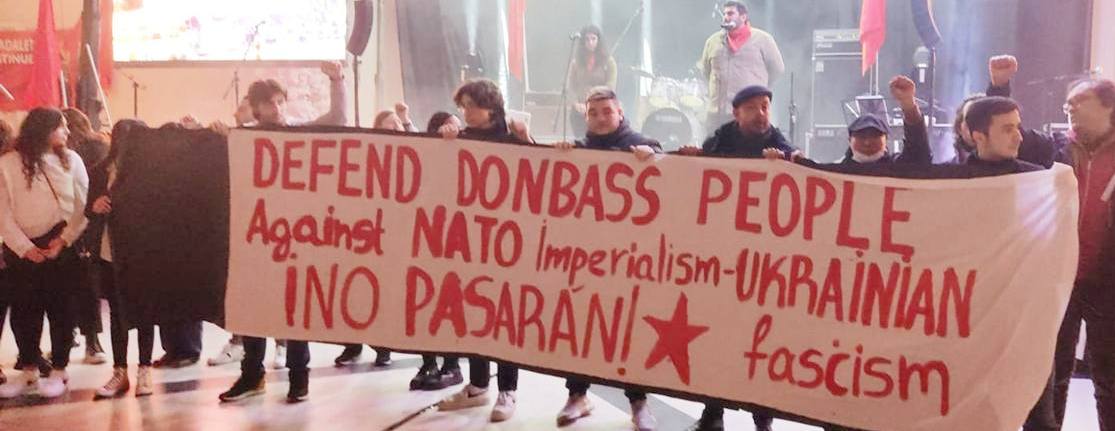
Paris, February 19, 2022.
We are providing below the statements of the President of the Russian Federation, of the President of the United States and the G7 Leaders’ Statement.
For the statement of the President of the Russian Federation, February 24, click here.
For the statement of the President of the United States, February 24, click here.
For the G7 Leaders’ Statement, February 24, click here.
(To access articles individually click on the black headline.)
Website: www.cpcml.ca Email: editor@cpcml.ca


